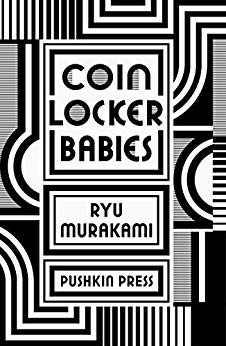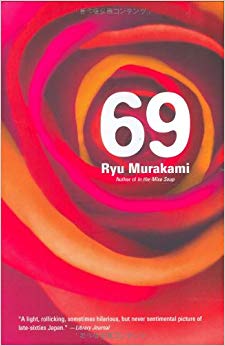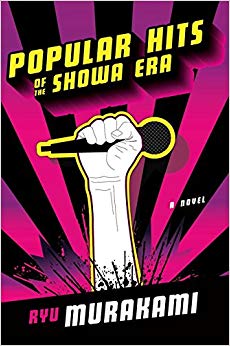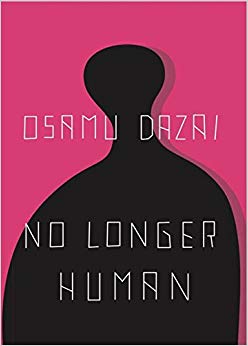Background
Ryū Murakami was born on February 19, 1952, in Sasebo, Nagasaki, Japan.

1 Chome-736 Ogawacho, Kodaira, Tokyo 187-0032, Japan
Murakami attended the Musashino Art University in 1972.
12-8 Uenokoen, Taitō, Tokyo 110-8714, Japan
Murakami was educated at Tokyo University of the Arts.
TV Tokyo - logotype
Ryu's Video Report






(Two babies are left in a Tokyo station coin locker and su...)
Two babies are left in a Tokyo station coin locker and survive against the odds, but their lives are forever tainted by this inauspicious start. As they grow up, they join the ranks of Toxitown: a district of addicts, freaks and prostitutes.
http://www.amazon.com/gp/product/B00BQAVA34/?tag=2022091-20
1980

(Here is a lighthearted, funny tale about a group of stude...)
Here is a lighthearted, funny tale about a group of students struggling to make sense of a rapidly-changing Japan in the late 1960s. But Murakami never loses his sharply perceptive view of the world, as he tells his coming-of-age story.
http://www.amazon.com/gp/product/4770030134/?tag=2022091-20
1987

(In his most irreverent novel yet, Ryu Murakami creates a ...)
In his most irreverent novel yet, Ryu Murakami creates a rivalry of epic proportions between six aimless youths and six tough-as-nails women who battle for control of a Tokyo neighborhood.
http://www.amazon.com/gp/product/0393338428/?tag=2022091-20
2011

(The poignant and fascinating story of a young man who is ...)
The poignant and fascinating story of a young man who is caught between the breakup of the traditions of a northern Japanese aristocratic family and the impact of Western ideas.
http://www.amazon.com/gp/product/0811204812/?tag=2022091-20
Ryū Murakami was born on February 19, 1952, in Sasebo, Nagasaki, Japan.
Murakami was educated at the school in Sasebo, graduating from it in 1970. He then attended the Musashino Art College (now Musashino Art University) in 1972, as well as the Tokyo University of the Arts.
Although Japanese writer Ryu Murakami has enjoyed considerable publicity in his native land, he remains a relative unknown in the Western world. Murakami was among the first Japanese to pick up the torch of the no-holds-barred lifestyle explored in the United States by Beat writers such as Jack Kerouac, Hunter Thompson, and, more recently, Bret Easton Ellis. He was also a drummer of a rock group Coelacanth, forming later his own rock band. In the 1990s, Murakami distributed Cuban music in Japan and created a label within Sony Music named Murakami's.
In 1999, Murakami established his e-mail magazine JMM (Japan Mail Media). He still holds the position of its chief editor. Beginning from 2006, Murakami has hosted a talk show Kanburia Kyude on TV Tokyo. That same year he began to stream videos on his service Ryu's Video Report (RVR). Four years later Murakami founded G2010 - a company specializing in selling and producing eBooks.
Concerning his writings, Murakami is a member of Postmodernism literary movement. He published his first book in 1976, under the title Almost Transparent Blue. Into the Seventies the Japanese literary tradition continued to follow narrower subject matters, and that country’s readers and critics were seemingly unprepared for Murakami’s chosen topic of decadence, as well as the vividness with which he describes it.
Murakami’s next two projects, neither of which have been translated into English, continue in the same decadent vein. Novel War Begins Beyond the Sea describes a drug user and his girlfriend who lay on a beach and watch the decline of a (probably) imaginary city that appears to them like a hallucination across the ocean. Murakami’s 1987 novel, Fascism of Love and Fantasy, treads similar ground. The “hero”, Toji Suzuhara, dreams of creating a fascist state in which he would wield power to redistribute resources.
The title of Murakami’s follow-up novel, Sixty-nine, refers to the year 1969, when Japanese students protested strongly against various government policies. Sixty-nine is perhaps best summed up by a Kirkus Reviews critic, who dubbed it “a great deal of fun.”
Coin Locker Babies, his next novel, returns Murakami to the absolute fringes of rigid Japanese culture. His 1994 The World in Five Minutes From Now was written as a point of view in a parallel universe version of Japan. Murakami's other novels include Truth of a cup of wine, Topaz II, In the Miso Soup, Parasites, Hello Life from 55 years old, Audition. Murakami is also the author of short stories and picture books.
Murakami received Gunzoo Newcomer Prize and Akutagawa Prize from the Society for the Promotion of Japanese Literature, both in 1976, both for his novel Almost Transparent Blue. The novel ended up selling more than a million copies in Japan in its first six months. Murakami became the winner of the 3rd Noma Liberal Arts New Member prize in 1980 for the book Coin Locker Babies. His The World in Five was nominated for the 30th Tanizaki Prize. The next prize which Murakami won was the Hirabayashi Taiko literary prize. Murakami also earned the Yomiuri Prize for the novel In the Miso Soup. Among his othere awards there are the 36th Tanizaki Prize, for novel Parasites, and the Mainichi Art Award, for Utau Kujira.
Murakami's Topaz II was adapted as film titled Love and Pop. The novel Audition was made into a feature film.
(In his most irreverent novel yet, Ryu Murakami creates a ...)
2011(The poignant and fascinating story of a young man who is ...)
(In this gloriously over-the-top tale, Aoyama, a widower w...)
1997(Two babies are left in a Tokyo station coin locker and su...)
1980(In the Miso Soup tells of Frank, an overweight American t...)
1997(Here is a lighthearted, funny tale about a group of stude...)
1987(Grotesque is a brilliantly twisted novel of ambition, des...)
(There are three linked stories about desire and obsession...)
2016(Almost Transparent Blue is a brutal tale of lost youth in...)
1976Murakami married Tazuko Takahashi on September, 1976.
